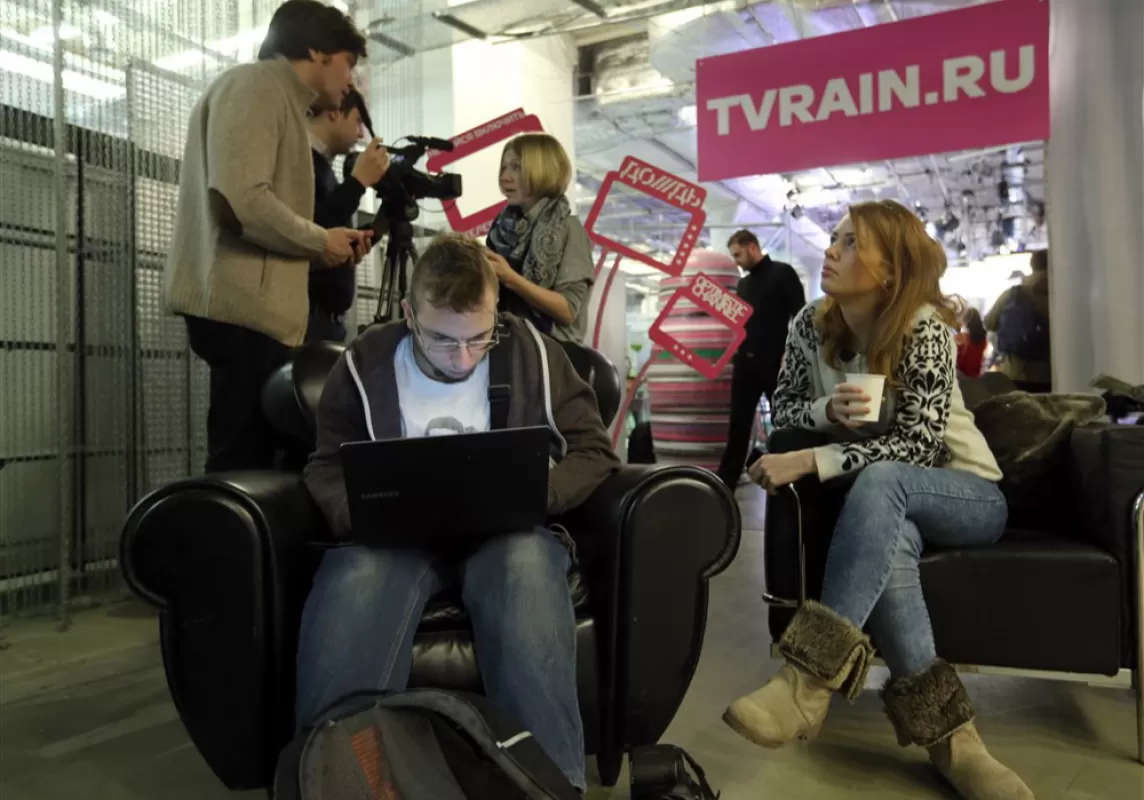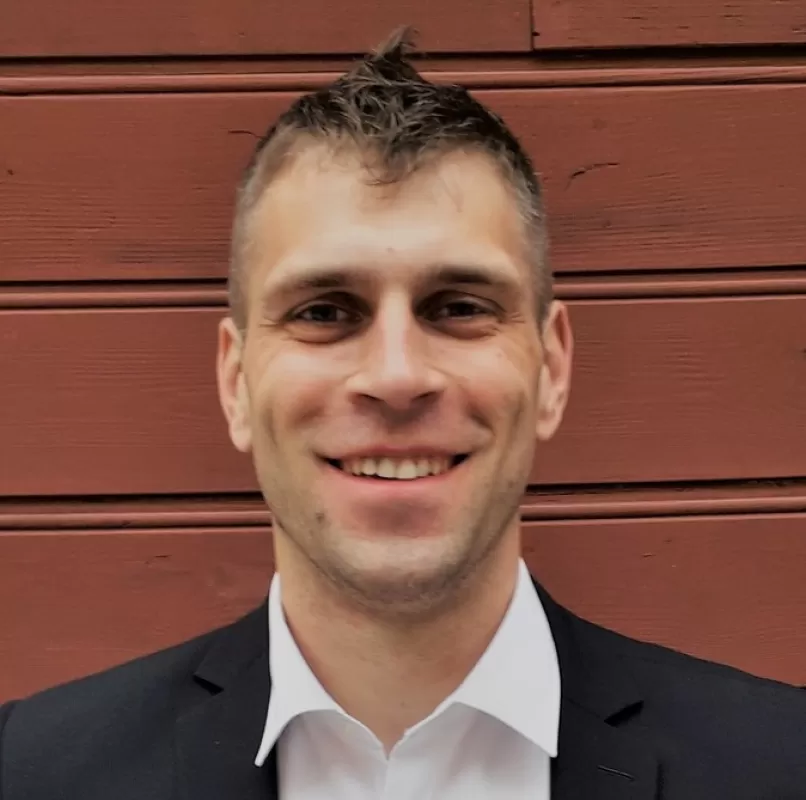
As the Kremlin made it virtually impossible for independent media to work in Russia, many outlets and journalists took refuge abroad. The Baltics offered such a safe haven including to the famous TV Rain, which moved its main operations to Latvia. After broadcasting for several months, TV Rain’s license was revoked for not complying with the Latvian rules and showing sympathy for the Russian troops fighting in Ukraine. However, Riga’s decision, while considered too harsh by some, did not lead to an exodus of Russian independent media from the Baltics.
Keeping the Russians informed: as pro-Kremlin voices took over Russia’s broadcasting, Latvia offered a safe haven for independent journalists
After the 24th of February, when Russia started the war in Ukraine, TV Rain was one of those media that was forced to end their work in Russia, as the Kremlin censorship regarding the war coverage became increasingly harsh – the media was not even allowed to call it a war, being told to use the euphemistical “special operation”. Contrary to other, especially state-owned media, TV Rain criticised the attack on Ukraine. The journalists themselves left Russia because they feared for their own safety. After a few months of silence, the first news arrived that TV Rain could continue its work in Latvia. Soon, on July the 6th, TV Rain got the broadcasting license and on the 18th of July restarted their work. Most of the journalists and other employees, including the editor-in-chief, Tikhon Dzyadko, were based in Riga; some of the staff worked from small studios in Tbilisi and Amsterdam. „Riga is a great city and always very stimulating. I don’t know how long we’ll be here now, but I hope we’ll be fine,” T. Dzyadko told Latvian Radio in July.
„It was the effect of Meduza”, Gunta Sloga, who heads the Baltic Centre of Media Excellence, told Veridica. Meduza is an independent Russian media outlet that moved to Riga after the 2014 annexation of Crimea. „Meduza became an example that one can quit Russia and successfully work abroad and even turn [turn the work] into a business”, she explains.
Setting up shop in Latvia makes sense for the Russian journalists forced to leave their country. It is close to home, many – if not most – people have speak at least some Russian and they better understand Russia and the Russians. Also, it is cheaper to live in Riga than in Western Europe. And, finally, the Latvian foreign minister Edgars Rinkevics announced on Twitter that Riga welcomes independent Russian journalists. „Russian public in Russia and around the world must receive truthful and objective information,” he tweeted.
The deputy of the head of The National Electronic Mass Media Council of Latvia – the institution that reviews the work of electronic media broadcasting - Aurelija Ieva Druviete points out that welcoming the Russian media in Latvia was the state politics. “Initially, we helped TV Rain a lot in submitting the documents. As quickly as possible,” she recalls. “I do not know if we have ever reviewed any documents so quickly,”
“We are sharing the same aim – democratic and free Russia and media freedom,” added Sloga in remarks for Veridica. She estimates that as of January 2023, some 300 Russian journalists were working in Riga. Many outlets have only some of their staff in Latvia, as, just like Rain TV, they operate from several countries simultaneously.
The mistakes that brought Rain TV in Riga’s crosshairs, from ignoring language regulations to rooting for the Russian troops
However, the honeymoon did not last for a long time. In the first part of August, some Latvians were not happy with the way one of the most famous anchors of TV Rain Ekaterina Kotrikadze handled an interview with Riga mayor Martin Stakis. They felt the journalist was too harsh. TV Rain was also criticised for its coverage of the the dismantling of the Monument of Victory dedicated to Soviet soldiers and hated by many Latvians. Many also took a negative view of TV Rain's call for Europe, including the Baltics, to open its borders to people mobilized in the Russian army in September 2022. TV Rain also came increasingly under scrutiny for its general attitude towards Latvia, with some Latvians blaming the media organisation for what they felt was arrogance towards their country.
The turning point came on the 1st of December when anchor Alexei Korostelev urged for the support of mobilized Russian troops calling them “our army”. Despite the fact that TV Rain acknowledged the mistake and sacked A. Korostelev, who now officially is “persona non grata” in Latvia, the National Electronic Mass Media Council of Latvia announced that it’s revoking the „TV Rain’s” broadcasting license. It meant that TV Rain lost an opportunity to be broadcast not only in Latvia but also in the whole European Union. The Council noted that it was already the third time when Rain TV was breaking Latvian regulations. Previously, this Russian media got yellow cards for displaying a map in which occupied Crimea was marked as Russian territory and not providing a language track in Latvian. In January, TV Rain paid the 10 000 EUR fine for the mistake of the map but appealed a separate 4000 euro penalty for not providing a language track. „If foreign television broadcasts to audiences of both Latvia and other countries, then the Latvian language track is mandatory. TV Rain knew this condition. We reminded them twice, which is proved by two letters” says A. I. Druviete. She added that other televisions that invested in this track, demanded by Latvian law, have asked, why TV Rain is exceptional.
- Dzyadko in January told Latvian MPS that the Latvian track was not ready because of the lack of technical equipment, the mistake of the map is explainable by the error of the designer, and that calling the Russian army as “our army” must be looked at in the context of the whole program. In December in a conversation with Latvian Television, he emphasized that TV Rain did not support the Russian army. „We have never supported the Russian army. And because we do not support it, but we regard the Russian army as a force committing war crimes on Ukrainian territory, that is why we are not now in Russia”
Is the penalty too harsh?
TV Rain acknowledged its mistakes but insisted that the penalty – the revoking of the broadcast license – was too harsh. However, A. I. Druviete pointed that TV Rain violated Latvian laws several times. „Probably, TV Rain did not understand the essence of infringements and, probably, they looked on us as a country where [laws are optional]. But we are changed and here the laws must be respected”.
- Sloga, whose organization helped TV Rain start a new life in Latvia, thinks that the decision by the Media Council was too strict. „The question on TV Rain was too politicized and the situation was used by nationalistic political parties that are painting everything in black and white or for and against. The search for the enemy is very comfortable and TV Rain in an absurd way became an enemy (…) TV Rain made several serious mistakes and an answer to those was necessary, but the decision was disproportionate,” says G. Sloga.
She points out that there are some questions regarding a report of the Latvian State Security Service about TV Rain. The State Security Service argues that the media organisation threatened the security of Latvia, but as the report is classified, no one is sure why. G. Sloga thinks that the chairman of the board of the Media Council Ivars Abolins yielded to the „political conjuncture”, but his deputy, A. I. Druviete vehemently rejected the allegation, claiming that there is no way to influence something, not even unofficially.
Nevertheless, G. Sloga agrees that TV Rain made mistakes – for instance, only after broadcasting the map with the “Russian” Crimea, the media outlet set up internal regulations for showing graphics and maps. Also, contrary to other Russian media, TV Rain had not realized where they have arrived. Latvia still lives in the collective trauma caused by the Soviet occupation and matters related to Russia’s assertiveness are very sensitive.
Asked why TV Rain is the only Russian media that experienced any problems in Latvia, G. Sloga indicates that “TV Rain is the biggest, the loudest, and the only one that asked for the broadcast license and faced the Media Council”. Besides, TV Rain has its own detractors who are searching for the mistakes done by this Russian media, for instance, in Ukraine.
Despite the row around TV Rain, for now the Russian independent media continues to work from the Baltics
Despite the heated debates around TV Rain, the future of the independent Russian media based in Latvia seems secure; moreover, the whole TV Rain situation seems to have had little, if any, impact on the Russian media working in all the three Baltic states.
The deputy president of the Estonian Association of journalists Ago Gaskov remembers that there was not a specific reaction in Estonia. “To call the Russian army ‘our army’ means that they empathize. Why? I do not know. Another thing that one can notice here is the syndrome of an older brother”, he adds. According to him, this row showed the Russian attitude to Baltics in general. “TV Rain wanted to teach you how to live. In general, there was a feeling that Russian intellectuals look at the Baltic with a soft, but still imperialistic view,” says A. Gaskov. He nonetheless refused to evaluate Latvia’s decision on “TV Rain”. “Nobody [in Estonia] neither praised nor criticized Latvians,” he adds.
Lithuania’s capital Vilnius is also a hub for Russian, and Belarusian, independent media outlets. The project director at Freedom House and the leader of the organization’s Vilnius office, Vytis Jurkonis, estimates that around 300 journalists from both countries are working in Lithuania. He admits that also in Lithuania the reaction was emotional. During a conversation with Veridica he said several times that there is no drama: „They [TV Rain] will survive. Independent journalists will work in Latvia”. However, Jurkonis insisted that Russian media must be careful in handling its relationships with Baltic societies and their sensitivity.
As for Latvia, A I. Druviete stresses that the country is still open for Russian media, but the laws must be respected. G. Sloga has a different take on the TV Rain affair, feeling that Latvia’s international prestige as a country where journalists can work freely took a blow.
For now, there are no indications that other Russian media are about to leave Latvia. However, the whole TV Rain situation probably determined some of them to at least think about relocating part of their staff and activities to other countries.


